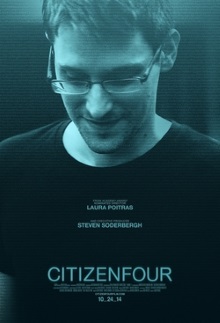
If you’ve never heard of Edward Snowden before this you probably live under a rock or something. This documentary is obviously about him and was made by Laura Poitras, a filmmaker who was one of the first people to be anonymously contacted by Snowden offering his leaked information. It went on to win the Oscar for Best Documentary last year though I don’t believe it was ever widely shown in cinemas in the US.
It’s important to note what Citizenfour is not. Contrary to my own expectations, it is not a comprehensive overview of the information that Snowden extracted from his employers at the NSA. It does spend some time on trying to impress on the viewer the pervasiveness and illegality of the US government’s surveillance, but you get few details beyond a lot of acronyms about how exactly it works and why it matters. For all this, Glenn Greenwald’s original exposés in The Guardian remain far superior. There isn’t much in the way of moral or philosophical debate either. You get lots of soundbites about how lack of privacy means lack of freedom and how that’s a short hop away from a totalitarian government, but this film makes no effort to find a balance between privacy and legitimate security needs. This documentary pretty much assumes that the audience agrees with it that the right to privacy is paramount and that the government already has the tools it needs to combat terrorism and other similar threats without needing to curtail that right.
What Citizenfour is is instead a sometimes shockingly intimate portrait of Snowden himself, as expressed in the communication logs that led to his meeting up with Poitras and Greenwald and most of all the extended interview they conduct together at a hotel in Hong Kong. His explanations of his work and his motivation behind leaking the information are very interesting, but even more fascinating are the minutiae behind all of the scenes. You can see their seriousness in the elaborate security measures that they take, such as Snowden using a cloak to cover himself when typing his password into his laptop. At one point early in the interview the hotel’s fire alarm abruptly sound and the conspirators, for this is exactly what they are, share a panicked moment as they wonder how they were busted before they even really started anything. The nervous tension is so thick you could cut into it and you get the sense that they expect the hotel room door to be kicked down at any moment.
Poitras makes some surprising choices about what to leave in the final film, which in retrospect is what it so unique and special. One long take has Snowden grooming himself, fussing with his hair and his clothes, as he prepares to leave the hotel room for the first time in presumably many days in order to meet the press. We watch as they discuss such sundry matters as Snowden’s meals, where he should stay after he’s outed himself as the source of the leaks or even how he should travel to an event since they don’t have access to a private car. These scenes make you feel like you’re a participant in their plans, like you’re getting in on the ground floor of a world-shaking conspiracy and that even Snowden is a personal pal. I’ve never watched anything quite like this before.
To do what he does, Snowden must obviously be a very smart guy but even so, the clarity and intelligence with which he expresses his views still managed to impress me. In fact, he’s much more articulate than the veteran journalist Greenwald who speaks in rather vague terms. I find it especially intriguing and even Machiavellian how they are aware that the government will likely respond to the leak with an assault on Snowden as a person and use that to change what the story is about. As for Poitras, while we occasionally hear her voice as she asks questions or positions the camera, we never get to see her.
Unfortunately as interesting and well thought out as this documentary is, it doesn’t try hard enough to change the minds of the audience. It’s hard to make the case that pervasive surveillance is harmful without some concrete examples, of which this documentary is entirely lacking. The window of opportunity for that may well have passed as both the Snowden and the later Manning leaks that is hinted at towards the end of this film has done next to nothing to change government behavior. I concede that as duplicitous as President Obama’s quote in this film is about how any changes must go through the proper legal channels, he is probably right that the American public as a whole has generally agreed with the need for widespread surveillance. The issue is not on the radar of any presidential candidate this year and if anything the public wants even more intrusive surveillance and other security measures to ensure safety. The net effect of the leaks seems to be that everyone now assumes that all electronic communications are constantly being monitored by governments and everyone is more or less okay with that.
One thought on “Citizenfour (2014)”